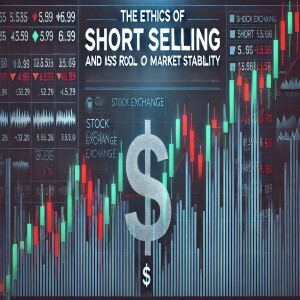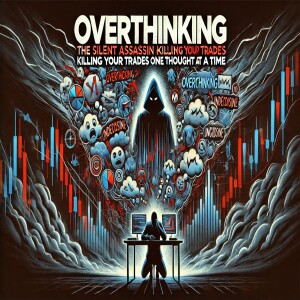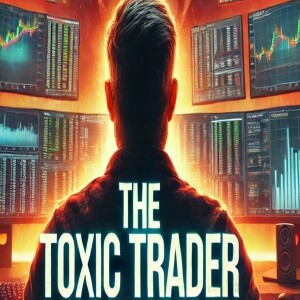Road To a Million's Podcast
https://edge.forex 📊 Welcome to Trading Mind Games — the podcast where we dive deep into the highs, lows, and emotional rollercoaster of trading! 🎢 Whether you're a seasoned pro or just starting your trading journey, we’re here to help you navigate the mental chaos 🧠, avoid burnout 💥, and sharpen your mindset for long-term success. 💡 Hosted by a seasoned trader who’s been through it all, we’ll uncover the psychology behind every decision 📉📈, why the market seems to mess with your head, and how to stay calm, cool, and profitable. 😎💼 ✨ What to Expect: Practical tips to protect your mental health 🧘♂️ Real-life stories from traders who’ve battled through burnout 💪 Proven strategies to stay disciplined and emotionally resilient 🎯 And a bit of humor to lighten the load 😂 Tune in every week as we turn the tables on the market, arm you with knowledge, and help you master the mental game of trading. 🎙️ 💰 www.roadtomillion.club
Episodes

Monday Oct 28, 2024
Monday Oct 28, 2024
Introduction: Why You’re Stuck Playing SmallAre you tired of hearing “you just gotta believe” or “one day, you’ll catch a break” from motivational speakers who sound more like Hallmark cards than real people? Well, today, we’re not here to coddle you. We’re here to get real. If you’re not where you want to be financially, it’s probably because you’re not raising your standards.Most people spend their lives with low expectations, waiting for the universe to bless them with a windfall while they’re glued to the couch. But real wealth doesn’t just “show up.” It’s built by people who set high standards and bulldoze through the obstacles. So, if you’re ready to actually get somewhere in life, buckle up and get ready for some hard-hitting truths.Join Our Discord…1. Cut the Dead Weight: Delete Loser FriendsLet’s rip off the Band-Aid: if your friends aren’t pushing you to level up, they’re pulling you down. Look around. Are the people in your life always complaining about how they almost got that big break, or how they’re “thinking about” starting something big but never actually do it? Guess what? They’re dead weight.Successful people don’t spend time with those who have a “loser mindset.” They hang out with doers, not dreamers who never take action. If your friends don’t challenge you, if they don’t support your ambitions, then you’re better off without them. Yes, it’s harsh, but winners don’t surround themselves with people who think small. You are who you spend time with – so pick wisely.Pro-tip: If you feel drained, demotivated, or like you’re dragging them along on your journey, it’s time to let go. Trust me, your bank account will thank you.Join Our Discord…2. Give Up on Luck & Hope – That’s a Broke Person’s StrategyHope is a beautiful thing when you’re sending someone good vibes. But as a financial strategy? It’s trash. Waiting around for luck to kick in or “hoping” something magical will change is the quickest way to stay broke. Wealth isn’t luck; it’s hustle, grit, and not taking “no” for an answer.Successful people don’t sit around waiting for the stars to align. They’re out there putting in the work, learning from failure, and pushing boundaries. Hope didn’t make them rich; their work ethic did. The sooner you realize that, the sooner you’ll ditch the victim mentality and start taking control.Hard Truth: Blaming “bad luck” is just an excuse for people who haven’t put in the work. You don’t need luck – you need discipline and action.Join Our Discord…3. Stop Asking for Free Sh*t – Pay Your Way to SuccessYou want to be wealthy, but you’re constantly looking for a handout, scrounging for freebies, or asking successful people to “pick their brain” for free? Stop. This “freebie” mentality screams, “I don’t value myself enough to invest.” Wealthy people don’t look for shortcuts; they pay for expertise and invest in themselves.Here’s the thing: anything valuable costs something – time, money, or effort. Free stuff can only get you so far before you’re swimming in a sea of cheap, low-quality information that everyone else has. If you want to stand out, start paying for quality knowledge and connections. Freebies don’t build empires – investments do.Pro-tip: The next time you think about asking for a freebie, remember this: the best investment you can make is in yourself. And investing in yourself usually isn’t free.Join Our Discord…4. Ditch the Lottery Mindset – Wealth is Earned, Not WonA lot of people are secretly waiting to hit the jackpot. They’re dreaming of winning the lottery or fantasizing about some magical payday that’ll solve all their problems. This kind of thinking is the fastest way to stay poor. Lottery winners go broke because they’re not prepared for wealth – they’ve spent years thinking like broke people.The truth? Real wealth isn’t luck. It’s intentional. It’s built over time by setting goals, creating multiple income streams, and reinvesting your earnings. The people you see living out their dreams didn’t wait for a lucky break. They worked like no one else so they could live like no one else.Challenge Yourself: If you’re putting your faith in a lottery ticket or some other get-rich-quick scheme, stop. Start building something real, one step at a time.Join Our Discord…5. Burn the Idea of Coupons and Discounts – Raise Your StandardsLet’s talk about bargain hunters. If you’re constantly searching for discounts, clipping coupons, or spending hours finding the “cheapest” option, you’re setting yourself up for mediocrity. When you prioritize saving a few bucks over buying the best quality, you’re programming yourself to settle for less.Successful people aren’t looking for the cheapest – they’re looking for the best. They understand that quality costs, and they’d rather pay for something once than keep buying cheap that needs replacing. When you raise your standards, the universe responds. Stop valuing things based on discounts and start focusing on quality.Harsh Reality Check: Want first-class results? Stop flying coach in your life choices. Start acting like you deserve the best, and you’ll begin to see it in your life.Join Our Discord…Conclusion: Raise Your Standards, Raise Your LifeIf you want to live like the top 1%, you can’t act like the other 99%. Stop waiting for luck, stop settling for low standards, and start valuing yourself enough to invest. Wealth isn’t a matter of chance; it’s a matter of choice. And that choice starts with you.So, here’s your wake-up call: look at every area of your life and ask yourself – are my standards high enough? Or am I just talking big and hoping the universe cuts me a break? If it’s the latter, then raise your standards. Because the truth is, the universe doesn’t give handouts. But it does reward people who refuse to settle.Final Words: Want to get wealthy? Start acting like it. Stop hanging out with small thinkers, stop hoping for a miracle, and start expecting better. Wealth isn’t handed out. It’s earned by people with high standards and even higher levels of hustle. So, go out there and get it.Join Our Discord…FAQsQ: Isn’t it harsh to just “delete” friends who aren’t supportive?A: It might seem harsh, but if your friends are holding you back, they’re not really your friends. True friends push you to be better, not stay the same.Q: Isn’t hope important for success?A: Hope is nice, but action is better. Hope without a plan is just wishful thinking. To succeed, you need more than just hope – you need to put in the work.Q: I don’t have a lot of money to invest. What should I do?A: Start small but smart. Investing in books, online courses, and self-education can be inexpensive but invaluable. Don’t wait for “extra” money – invest what you can, and increase as you grow.Q: What if I can’t afford quality things right now?A: This isn’t about going broke to buy expensive things. It’s about shifting your mindset. If you’re always looking for the cheapest, you’re programming yourself to stay there. Focus on quality where you can, even if it’s just in small ways.Q: Why shouldn’t I look for discounts and coupons?A: There’s nothing wrong with finding deals, but when “cheap” becomes your mindset, you’re telling yourself you don’t deserve more. Wealthy people prioritize value, not just price.This isn’t for the faint of heart. If you’re ready to stop living small, if you’re ready to stop making excuses and actually start building wealth, then it’s time to take a hard look at your standards and start raising them. This is a public episode. If you would like to discuss this with other subscribers or get access to bonus episodes, visit www.roadtomillion.club

Saturday Oct 26, 2024
Saturday Oct 26, 2024
Hello, dear traders! Let’s talk about that special friend (or foe) in all of us… GREED. 💸 Oh, you know the one: the voice in your head whispering, “One more trade… just one more!” Right before things hit the fan. 😬Join Our Discord…1. The Allure of Unlimited Gains ✨Let’s be honest: we all secretly believe we’re the next Warren Buffett, right? Or maybe a Forex magician who turns pennies into pips 🪄✨. Greed’s got you hypnotized, baby. But let’s remember: even the Buffetts of the world take calculated risks. Greed, though, doesn’t care about math 🧮. It’s too busy picturing you in a Lambo 🚗💨.Pro Tip: When your trading account starts to resemble Monopoly money, it might be time to take a breath. 🧘♂️ Greed whispers “all in!” but Experience says, “You might wanna sit this one out.”Join Our Discord…2. The FOMO Spiral 😱A little uptrend, and suddenly you’ve got FOMO like it’s Black Friday. 📉📈 The irony? The market knows when you’re feeling desperate. It’s like it has some sixth sense to show you a high just to nosedive the moment you’re in. 🎢Reality Check: If you chase every single setup, you’ll end up with a trading account emptier than your dating app matches 📉😂.Join Our Discord…3. Greed’s Favorite Game: Overtrading 🎰Greed’s like, “Keep going, what could possibly go wrong?” Oh, just your entire bankroll, that’s all. Because the worst enemy of a trader isn’t the market – it’s the volume of trades fueled by that inner must-have-it-all demon. 👹Quick Self-Test: Look at your last five trades. Did you really need them all, or did you just let Greed drive? If that answer stings, join the club. 🤦♂️Join Our Discord…4. The “Hold and Hope” 🤞 TrapSo you didn’t sell on that last spike. Why? Because “it could go higher.” 🚀 Sound familiar? Greed’s got you in the classic HODL chokehold. Spoiler alert: hope is not a strategy. The more you hold, the more you’re playing chicken with the market. 🐔Join Our Discord…5. Reeling It In 🎣Greed doesn’t just want a slice of the pie; it wants the whole bakery. 🍰 So how do you beat it? Start by acknowledging it’s there. Accept that you’ll never “beat the market” every single time. ✋Greed won’t like this advice, but sometimes the best trade is no trade at all. So maybe give that trigger finger a break, lean back, and let the trades come to you.Join Our Discord…Final Thoughts: Greed - The Shadow on Every Trade 🌑Trading’s a marathon, not a sprint. Greed wants you to be the Usain Bolt of Forex, but trust me, you’ll burn out faster than you can say, “margin call.” Greed’s there, it’s loud, but like any other hitchhiker in life – it only gets a ride if you give it one. 🎢Join Our Discord… This is a public episode. If you would like to discuss this with other subscribers or get access to bonus episodes, visit www.roadtomillion.club

Thursday Oct 24, 2024
Thursday Oct 24, 2024
In this episode from Edge-Forex, Vinit takes a deep dive into the Dollar Index (DXY) chart as of October 24, 2024. The DXY is at a critical inflection point, and things are about to get wild. Will it break above resistance and surge to 115, or crash below 102, taking the markets by storm? Vinit walks through the key levels, breaks down what the chart is telling us, and shares his bold predictions. Jump in the discussion and share your take—whether you agree, disagree, or think he's full of it! 💥🚀 #DXY #DollarIndex #Forex #TradingPlease Join Our Discord… This is a public episode. If you would like to discuss this with other subscribers or get access to bonus episodes, visit www.roadtomillion.club

Thursday Oct 24, 2024
Thursday Oct 24, 2024
Introduction:Before we dive headfirst into what might be the wildest crypto tale of all time, a big shoutout to Brent Johnson—the mastermind behind this deep dive. Thanks, Brent, for turning crypto chaos into something we can actually learn from. 🙌Alright, grab your popcorn 🍿 because today's story is bigger than any crypto scandal you've heard. We're talking about Mt. Gox, the once-mighty bitcoin exchange that crashed and burned so hard it made the Titanic look like a fender bender. If you've ever misplaced your keys and freaked out, imagine losing 850,000 bitcoins. Yeah, that’s what happened here. Buckle up! 🚀1. Mt. Gox: Not a Mountain, but a Disaster Waiting to Happen 🏔️👉💥Let’s clear this up first—Mt. Gox sounds like a majestic peak, but nope, it's far from it. In fact, it started out as a platform for trading Magic: The Gathering cards. Yeah, you read that right. 🎴🔮In 2010, Jed McCaleb thought, “Hey, why not use this for bitcoin?” because who wouldn’t want to pivot from nerdy trading cards to a multi-million dollar crypto exchange, right? And guess what? He was on to something. By 2011, Mt. Gox was handling 70% of all global bitcoin transactions. It was like the Amazon of crypto! Except, well… without Amazon's customer service and security… which is kind of important, right? 😬Join Our Discord…2. The Rise of a Crypto Empire… Sort Of 💹🤑By 2013, Mt. Gox was living large. People were trading bitcoin faster than you could say “moonshot.” 🚀 It was the place to be for bitcoin traders.Mark Karpeles, the new guy in charge after McCaleb handed over the reins, embraced the go big or go home philosophy—except he seemed to skip over the part about locking the doors before you go big. 🏠🔑 Security? Pffft, overrated. Basic customer service? What’s that? 😅Mt. Gox became the crypto version of a high-stakes casino where the house doesn’t always win—spoiler alert: neither do the customers.3. 850,000 Bitcoins, Gone Like Your New Year’s Gym Membership 🏃♂️💸Now here’s where it gets wild. You’d think with 70% of bitcoin transactions running through their platform, Mt. Gox would at least invest in a decent security system, right? WRONG. ❌By 2014, users started reporting issues when withdrawing their bitcoins. It was like trying to get your bank to give you $20, and they’re like, “Yeah, about that... we’ll get back to you… never.” 🏦🚫Turns out, Mt. Gox had a slight security issue. Just a small one—like 850,000 bitcoins worth. 🧑💻 That’s $450 million back then. In today’s value? Try $20 BILLION. Yep, that’s right. They vanished like the password to your old MySpace account. 🎩✨Join Our Discord…4. When Hackers Stroll In Like They Own the Place 👾🔓The hackers? Oh, they were having a field day! It’s like Mt. Gox gave them VIP backstage passes to the greatest bitcoin heist ever. They practically waltzed in and out, grabbing bitcoins like they were free samples at Costco. 🛒Meanwhile, Mt. Gox’s security system was about as sturdy as a wet paper towel. If it were a lock, it’d be made out of spaghetti. 🍝🔐By February 24, 2014, Mt. Gox pulled the plug. The platform went offline, and poof, bitcoin traders were left with nothing but regret and a few “I told you so’s” from their skeptical friends. 😢👋Join Our Discord…5. The Cleanup: Enter the Janitor of Crypto, Nobuaki Kobayashi 🧹⚖️After the bitcoin bloodbath, who do they call to clean up this colossal mess? Nobuaki Kobayashi—the guy who walks in after the food fight’s over and somehow has to mop up the spaghetti-stained walls. 🍝🚿Kobayashi managed to recover 200,000 bitcoins from cold wallets—a crypto version of hiding cash under your mattress. 🛏️💰 It wasn’t the full 850,000, but hey, it was something! These 200,000 bitcoins were the only ones that didn’t get sucked into the Mt. Gox black hole. 🌌But here’s the kicker: It’s been nearly a decade, and people are still waiting to get their money back. Can you imagine waiting that long? It’s like finding $100 in your old jeans after losing $10,000. Lucky? Sure. Slow? Absolutely. ⏳6. What’s the Moral of the Story? 🤔📜So, what can we learn from the Mt. Gox disaster? Well, for starters:* Lock the front door, please! 🏠🔒 If you’re running a crypto exchange, maybe invest in some security? Just a thought.* Centralized exchanges can be convenient… until they’re not. ⚖️ One hack, and boom—you’re in a Mt. Gox 2.0 situation. That’s why decentralized exchanges are on the rise. More control for you, less chance of, “Oops, we lost everything” moments.* Trust, but verify. 🔍 Always do your homework and don’t trust too much. If an exchange's security system looks like it was a middle school science project, run—don’t walk—to the exit. 🏃♂️🚪Conclusion: Don’t Be the Next Mt. Gox Victim 🚨🔐Congrats! 🎓 You’ve just earned a PhD in Mt. Gox Disaster Studies. The takeaway here? Crypto is exciting, volatile, and—if you’re not careful—full of “Mt. Gox” moments. Keep your crypto safe, your passwords safer, and never take security for granted. 🛡️And hey, if you don’t want to wait a decade for our next crypto story, smash that subscribe button and ring the bell 🔔—it’s faster than Mt. Gox’s recovery process, I promise.Until next time, keep your coins secure and your exchanges well-locked. 🔒FAQ:Q: What was Mt. Gox?A: Mt. Gox was once the world’s largest bitcoin exchange, handling 70% of all bitcoin transactions until its epic collapse in 2014, when it lost 850,000 bitcoins due to security flaws and a major hack.Q: How much were the lost bitcoins worth?A: At the time, they were worth around $450 million. Today, they’d be valued at over $20 billion. 😳Q: Has anyone gotten their money back?A: Nobuaki Kobayashi recovered 200,000 bitcoins, and creditors have been waiting for compensation since then—over a decade later!Q: What’s the main lesson from the Mt. Gox collapse?A: Always verify the security of the platform you're using. Trust is important, but when it comes to crypto, security should be your top priority. This is a public episode. If you would like to discuss this with other subscribers or get access to bonus episodes, visit www.roadtomillion.club

Tuesday Oct 15, 2024
Tuesday Oct 15, 2024
Short selling. It’s the financial world’s dirty little secret, right? Or is it? Depending on who you ask, short selling is either a predatory practice that preys on struggling companies 🦅 or an essential mechanism that keeps markets in check 🔍📊. But when you peel back the layers, the ethics of short selling and its role in market stability is anything but straightforward.So, what’s the deal with short selling? Let’s strip away the financial jargon and look at what’s really going on here, the ethical dilemmas it poses, and whether or not it actually helps the market or just adds fuel to the fire 🔥📉. Buckle up! 🚀Join Our Discord!What Is Short Selling (And Why Should You Care?) 🤔Let’s break it down in layman’s terms: short selling is when a trader bets that a stock’s price will go down 📉. They borrow the stock, sell it at its current price, and then wait for the price to drop. When (or if) it does, they buy the stock back at the lower price, return it to the lender, and pocket the difference 💰. Sounds simple, right?The concept behind short selling is essentially making money on the decline of a stock's value 🏦. While that sounds like rooting for failure, in reality, it’s not that cut and dry. Sure, some traders may target overvalued stocks 📈 or companies struggling to keep their heads above water, but others argue that short selling is actually a key component in maintaining market efficiency 🛠️.And here’s where the ethics come in: Is it okay to make a profit off someone else's downfall? 😬 Or are short sellers the financial whistleblowers, exposing the rotten underbelly of overhyped stocks? 🧐🍏Join Our Discord!The Ethical Dilemma: Is It Right to Bet Against the Market? 💭Ah, ethics. The eternal battleground of right versus wrong ⚖️, especially when money’s involved. Short selling brings up a host of moral questions.Critics argue that short sellers are market vultures, profiting from corporate collapse and, in some cases, accelerating that collapse by spreading fear and doubt 🦅💥. There are plenty of stories of companies on the edge, only to be pushed into a downward spiral by traders taking large short positions. Not exactly a feel-good story 🥺.But proponents see it differently 🔄. They argue that short sellers are doing the market a favor by identifying overvalued stocks and exposing companies that are engaging in questionable or fraudulent activities 🤔🚨. Think about the famous cases of Enron and Lehman Brothers. Short sellers played a pivotal role in revealing the shaky foundations of these corporations before their collapse 💣.So, are short sellers unethical opportunists, or are they acting as a watchdog 🐕, sniffing out the bad apples 🍎 in the market?Join Our Discord!The Role of Short Selling in Market Stability 🔑Let’s pivot to the big question: does short selling actually help or hurt market stability? Because for every claim that short sellers are market manipulators 🦹♂️, there’s an argument that they play a stabilizing role in the broader financial ecosystem ⚖️.The Case for Market Stability 🚦One of the key arguments in favor of short selling is that it enhances price discovery 🕵️♂️. In simple terms, it helps bring a stock’s price in line with its actual value. If a stock is overvalued, short sellers help bring the price down to a more reasonable level 🔻, which theoretically prevents bubbles from forming 🎈💥.In the absence of short selling, some argue that prices would become skewed 📉 as there’s no counterbalance to bullish investor sentiment 📈🐂. This can lead to irrational exuberance—a fancy way of saying investors go crazy 🤪 and drive stock prices way higher than they should be. And we all know what happens when bubbles pop 🎯. Hello, 2008 financial crisis! 🚨Short selling can also increase market liquidity 💧. Since short sellers borrow and sell shares, they add to the pool of available stock, which allows buyers and sellers to trade more easily. More liquidity generally means smoother functioning markets 🤝.The Case Against Market Stability 🛑But it’s not all sunshine and rainbows 🌤️. While short selling may enhance price discovery, there’s also evidence to suggest that it can exacerbate market downturns 🌪️. In times of financial stress, short sellers can pile on, driving prices down faster and further than they might have fallen on their own. This creates panic selling 😱, where investors start dumping stocks in a frenzy, leading to a cascading effect that destabilizes markets ⛔.Remember the meme stock frenzy of 2021? 📉 When retail investors on Reddit targeted heavily shorted stocks like GameStop 🎮, they caused massive volatility in the markets 🌊. Short sellers lost billions, but the ensuing chaos showed just how disruptive short selling can be when emotions run high and market dynamics spiral out of control 🌀.Regulation: Keeping Short Selling in Check 🚦The ethical concerns surrounding short selling have prompted various regulations aimed at curbing its potentially destabilizing effects 🛠️.For example, during times of financial crisis, regulators have implemented short-selling bans on certain stocks to prevent a freefall 🛑. After the 2008 crash, the SEC banned short selling on financial stocks to prevent the complete collapse of the banking sector 💥. In Europe, regulators imposed short-selling restrictions during the 2010-2011 sovereign debt crisis to stabilize markets 🇪🇺.But do these measures actually work? 🤷♂️ Critics of short-selling bans argue that they don’t solve the underlying problem and might even make things worse 📉 by creating artificial price floors and reducing market liquidity 🏦. Instead of allowing the market to correct itself, these bans can lead to inflated prices that eventually come crashing down anyway 💥.On the flip side, supporters of regulation argue that in extreme cases, intervention is necessary to prevent market freefall 🚨 and restore investor confidence 💪.The Impact on Companies: Is Short Selling a Death Sentence? 💀Short selling can have a very real impact on companies, and not always in a good way. For struggling companies 🏢, a large amount of short interest can spook investors and lead to a loss of confidence 😟, which in turn can make it harder for the company to raise capital 💵 or execute a turnaround plan 🔄.But for companies with inflated valuations or shady practices 🕵️♂️, short sellers are a crucial check. They can force management to address weaknesses 🛠️ or expose fraudulent activity that might otherwise go unchecked 🧾🔦. In this sense, short sellers can be the heroes of the market—albeit uncelebrated ones 🦸♂️.However, we can’t ignore the instances where short sellers have been accused of unethical practices 😡, like spreading false rumors 📢 or using aggressive tactics to drive a company’s stock down 📉. When done in bad faith, short selling can harm not only the company in question but also its employees, shareholders, and even the broader economy 🌍.Conclusion: Necessary Evil or Market Savior? ⚖️So where does that leave us? Is short selling an unethical practice that preys on vulnerable companies 🦅, or is it a vital part of a functioning market that ensures price discovery and liquidity? As with most things in finance, the truth lies somewhere in between 🤷♂️.Short selling has undeniable benefits for market stability 💡, but it also comes with risks that can amplify volatility and lead to unintended consequences 💥. Its ethical standing depends largely on the intentions and tactics of those who engage in it 🔍.At the end of the day, short selling is neither all good nor all bad. It’s a tool—one that can be used responsibly to improve market efficiency 🛠️ or abused for profit at the expense of others 💸. The key is to strike a balance ⚖️, ensuring that short selling can serve its purpose without undermining market confidence or stability 🤝.FAQs1. Is short selling illegal? No, short selling is a legal trading strategy, although it is regulated in many countries to prevent market manipulation 🛠️.2. Can short selling destabilize the market? While short selling can enhance market efficiency, it can also exacerbate downward market movements, leading to greater volatility 🌪️.3. Why do some people consider short selling unethical? Critics argue that short selling profits from the decline or failure of companies, which can harm shareholders, employees, and the broader economy 🌍.4. How does short selling contribute to price discovery? By betting against overvalued stocks, short sellers help bring prices in line with their true value, preventing bubbles from forming 🎈.5. What happens during a short squeeze? A short squeeze occurs when a heavily shorted stock’s price rises, forcing short sellers to buy back shares at a loss, driving the price even higher 🚀. This is a public episode. If you would like to discuss this with other subscribers or get access to bonus episodes, visit www.roadtomillion.club

Thursday Oct 10, 2024
Thursday Oct 10, 2024
IntroductionAlright, hustlers and traders, buckle up because today’s blog isn’t about blowing up your trades or missing out on a golden setup. Nope, today we’re stepping out of the charts and diving headfirst into the wild world of government asset seizures—a topic so outrageous it’ll make even your worst trading day feel like a mild inconvenience. 💥Ever thought losing a few pips was bad? Imagine waking up to find out the government decided it needed your farm, your gold, or basically everything you own. And no, this isn’t a far-off dystopian nightmare—it’s real history. 😱Governments have been playing this high-stakes heist game for centuries. Today, we’re digging into some of the most jaw-dropping asset grabs in history, the kind that’ll make you question where you’re stashing your assets. Ready to have your mind blown? Let’s go. 🔥Join us…Stalin’s Great Grain Robbery: When Owning a Cow Made You an Enemy of the State 🐄First stop: Soviet Russia. You think Joseph Stalin just built gulags and made everyone wait in bread lines? Think again. Stalin took it up a notch with dekulakization, a fancy word for robbing you blind if you owned more than a handful of grain or a cow. 🐄The guy literally weaponized famine by seizing farms, grain, and livestock from wealthier peasants—known as kulaks—and shipped them off to a forced Siberian vacation. 😳Imagine being a farmer, working your land, only to find the state has decided it’s not yours anymore. Stalin basically said, “If you’ve got more than the next guy, that’s a crime against the state.” Farms were seized, grain was confiscated, and entire families were stripped of everything they’d built. And what did they get in return? A one-way ticket to a labor camp where the only thing you’re producing is despair.This wasn’t just some ancient historical drama; it was a full-scale wealth grab that left millions destitute. Sure, blowing up your account in a bad trade hurts, but it’s nothing compared to losing your entire livelihood because of a government mandate. 😤Join us…Mao’s Cultural Revolution: The Original Red Army Yard Sale 🔴Fast forward to China in the 1960s, where Mao Zedong decided to launch the Cultural Revolution—a nationwide ‘purge’ of old customs, ideas, and, of course, wealth. The Red Guards, Mao’s personal clean-up crew, didn’t just stop at burning books and smashing artifacts. They turned homes upside down in search of anything valuable, and if they found it, it was gone. Got a family heirloom? Smashed. Some gold jewelry? Confiscated. Your family’s life savings? Well, it’s ‘for the people’ now—just don’t ask which people. 🤔This wasn’t a Robin Hood story where the rich lose and the poor win. It was chaos, plain and simple. People didn’t just lose their stuff, they lost their dignity. Yet somehow, amidst all this madness, there were those who got creative, hiding valuables in places the Red Guards wouldn’t think to look. Let’s just say grandma’s vase became a lot more valuable once it started hiding contraband. 💰Join us…Hitler’s Aryanization: When Confiscation Became a Full-Time Job 🖤Let’s not forget about Hitler and his crew of asset thieves. Under the guise of Aryanization, the didn’t just invade countries—they invaded people’s lives. Jewish homes, businesses, and savings accounts were all fair game. They systematically stripped away the wealth of Jewish families while claiming they were ‘purifying’ the economy. In reality, it was one of the biggest organized thefts in history. 🏚️People went to incredible lengths to protect their assets. Transferring funds abroad, hiding money in mattresses, even using non-Jewish friends as proxies in business deals. But no matter how clever the evasion tactics, the were relentless. The result? Entire family fortunes, artwork, and property, gone—just like that. And if you think the confiscations were brutal, don’t even get me started on their architectural choices. But that’s a whole other discussion. 🏚️FDR’s Gold Grab: The Day Americans Got State-Mugged 💰Now, don’t think this is just a ‘rest of the world’ problem. The United States had its own moment of confiscation with FDR’s Gold Grab. In 1933, during the Great Depression, Franklin D. Roosevelt dropped Executive Order 6102, making it illegal for private citizens to own gold. You had gold stashed under your mattress? Too bad—time to hand it over to Uncle Sam. People walked into banks looking like they were turning in their dignity along with their life savings. 😬This wasn’t some minor slap on the wrist; this was a full-blown confiscation of wealth. The government paid out for the gold, but at a price they set, and then they raised the value of gold afterward, effectively devaluing the cash they’d given out. It was the original bait-and-switch, with the government pulling the strings. 🎭Sure, they made exceptions for gold jewelry and rare coins, but if you weren’t an eccentric coin collector, you were out of luck. This was state-sanctioned robbery at its finest, wrapped up in the guise of economic recovery. It wasn’t just your gold—they were snatching your financial security. 💸What Does This Mean for You?So, why does all this matter to you? In a world where governments can—and have—taken whatever they want in the name of ‘the greater good,’ it pays to think twice about where you store your wealth. History has shown time and again that when governments need resources, they don’t mind taking yours. 💡Whether it's farmland in Russia, gold in the U.S., or assets in -occupied Europe, the message is clear: if it can happen before, it can happen again. The only difference now? They’ll probably have better PR the next time they try it. 📣Conclusion: The Long Con of Asset SeizureHere’s the kicker: governments have always played the long game when it comes to confiscation. It’s not just about taking wealth—it’s about controlling it. Whether they dress it up as economic policy, cultural revolution, or national security, the result is the same: someone is losing big, and it’s rarely the government. 🚨So, the next time you’re strategizing your trades or thinking about where to park your capital, remember the stories of Stalin, Mao, and FDR. The stakes might be higher than you think. And if history tells us anything, it’s that in the grand game of asset seizure, the house always wins. 🎲Keep your eyes on your trades and your assets hidden, because when Big Brother wants your stuff, they don’t ask twice. 🕵️♂️FAQs* Why do governments seize assets?Governments often claim to seize assets for the ‘greater good,’ such as stabilizing an economy or redistributing wealth. In reality, it’s usually about consolidating control. 🏛️* Can asset seizures happen today?Absolutely. While less common in developed countries, expropriation and confiscation still occur globally, often under the guise of national emergencies or economic policy. 🌍* How can I protect my assets?Diversification, international investments, and understanding the political climate in your country are all key steps to safeguarding your wealth from government overreach. 🔒* Was FDR’s gold seizure legal?Yes, at the time it was made legal by executive order. However, many debate the morality and fairness of the act, especially since it effectively devalued people’s savings. 💳* Are there modern examples of government confiscation?Yes. In recent years, countries like Venezuela and Zimbabwe have expropriated land, property, and assets as part of political and economic maneuvers. 🌎 This is a public episode. If you would like to discuss this with other subscribers or get access to bonus episodes, visit www.roadtomillion.club

Wednesday Oct 02, 2024
Wednesday Oct 02, 2024
Let’s get real for a minute. You’re sitting at your trading desk, the perfect setup is staring you in the face. You’re ready to strike. But wait… should you check another indicator? Maybe a different timeframe? What if news is about to drop? 😬Five minutes later, the opportunity has vanished. Gone. And you’re left asking yourself, “What just happened?” Well, I’ll tell you what happened: Overthinking—the silent assassin that’s slowly but surely killing your trades.The Psychology of Overthinking 🤯Here’s the brutal truth: overthinking isn’t just a bad habit—it’s a mental chokehold. You might think it’s helping you “be careful” or “make the right decision.” But in reality, it's freezing you in place while the market moves on without you. 👋It’s the equivalent of standing on the edge of the pool, dipping your toe in the water while everyone else is already swimming laps. You’re left there, stuck, watching the action happen while you stay motionless.And guess what? The market doesn’t wait for you. 🕰️Why Do We Overthink?The mind is a tricky place, especially when money’s on the line. 💸 It’s like your brain goes into overdrive, telling you that one more confirmation will give you the magic answer to avoid risk. Spoiler alert: there’s no magic answer.Here’s why we fall into the overthinking trap:* Fear of Loss 😱: You want to avoid getting burned, so you analyze every possible outcome to prevent a loss. But in the process, you lose the trade itself.* Perfectionism 🧐: You want to be “right” every time. The market must follow your strategy to a T, and anything less feels like a failure. Newsflash: trading isn’t perfect.* Lack of Confidence 😬: You’re not 100% sure about your analysis, so you keep looking for more signs, more proof. By the time you’re convinced, the market’s already moved.Sound familiar? Yeah, we’ve all been there.How Overthinking Sabotages Your Trading 🕳️You might think overthinking is harmless—it’s just you “being cautious,” right? Wrong. It’s sabotaging your entire approach. Here’s how:* Missed Opportunities 🚪: Every second counts in trading. While you’re busy overanalyzing, the market is leaving you behind. Trades that should have been winners are now missed opportunities because you were too paralyzed to act.* Indecision Equals Inaction ⏳: Too much analysis leads to indecision, and indecision leads to inaction. You’re stuck, caught between two minds, and in trading, no decision is still a decision—and often, it’s a costly one.* Mental Exhaustion 😵: Let’s be real: overthinking is mentally draining. The more you overanalyze, the more fatigued your brain becomes. And when your mind is tired, your judgment is skewed. Next thing you know, you’re making emotional trades just to break the paralysis.* Loss of Trust in Your Strategy 😩: Overthinking erodes your trust in your own system. If every time you second-guess yourself, you lose confidence in the strategy you’ve spent so long developing. If you don’t trust your system, how can you ever execute properly?How to Kill Overthinking Before It Kills Your Account 🚨So, how do you break free from this vicious cycle? It’s not easy, but it’s possible. Here’s how you can flip the script:1. Trust Your Strategy 💼If you’ve done the work and backtested your strategy, then trust it. You don’t need 15 indicators or to check the news every 10 minutes. If your setup meets your criteria, pull the trigger. Period. 🎯2. Set Clear Rules 📋One of the biggest causes of overthinking is ambiguity. Set strict rules for your entries, exits, and risk management. When the trade meets the criteria, you act—no questions, no hesitations.3. Limit Your Information 🔍The more data you consume, the more you’ll doubt yourself. Pick a few reliable sources and stick to them. Information overload is the quickest route to analysis paralysis.4. Practice Decision-Making 🧠Start making smaller, quicker decisions in your everyday life. This builds up your decision-making muscle, which translates into quicker, more confident trading decisions.5. Stick to One or Two Indicators 📊A chart full of indicators isn’t giving you more clarity—it’s creating more confusion. Strip down your charts to the essentials, and trust that the market will show you what you need to see.The Final Blow 🥊Overthinking in trading is like trying to steer a ship from a rocking chair—lots of movement, but no actual progress. You’re not gaining an edge by overanalyzing; you’re paralyzing your potential.The market rewards those who can make decisive, strategic moves. So stop letting the silent assassin take you out one thought at a time. Master your mindset, trust your system, and watch as the market finally starts to work for you, not against you. 🧠💥So, are you ready to silence the overthinking and start trading like you mean it? Or are you content letting the market sail right past while you’re stuck in your head? 🤔The choice is yours. #NoExcuses This is a public episode. If you would like to discuss this with other subscribers or get access to bonus episodes, visit www.roadtomillion.club

Monday Sep 30, 2024
Monday Sep 30, 2024
Are YOU the reason your trading profits are disappearing? 🤔Let’s be real—it's not the market, it’s YOU. Every time you:* Chase losses 💸* Ignore your trading plan 📉* Overtrade on impulse ⚡️...you’re blowing up your own profits. Self-sabotage in trading is like hitting the eject button just before takeoff. 🚀🛑 STOP. RIGHT. NOW.Join Our Discord…Take control before you sink further. Reassess. Stick to your rules. The market isn’t your enemy—you are, until you decide to get out of your own way.👉 Ready to stop the cycle and actually WIN in the markets?Join Our Discord… This is a public episode. If you would like to discuss this with other subscribers or get access to bonus episodes, visit www.roadtomillion.club

Saturday Sep 28, 2024
Saturday Sep 28, 2024
Ah, the elusive ego! It’s that sneaky little voice in your head that insists you’re a trading prodigy after one good day and then slaps you silly when you hit a losing streak. 🎭 Trading is a game of numbers, but let’s be honest—it’s also a psychological minefield! Let’s dive into how our egos can sabotage our trading success and turn us into our own worst enemies. 💣1. The Illusion of Control 🎮First up, let’s chat about control. Ever felt invincible after a couple of profitable trades? That’s your ego doing a victory dance! 💃 But let’s not forget: the market doesn’t care about your ego! It’s unpredictable, wild, and more volatile than your last relationship. Remember, just because you had a lucky streak doesn’t mean you’re a genius. The market can switch gears faster than your ex swiped left! 🔄Join Our Discord…2. Chasing the Highs, Ignoring the Lows 🎢Ever been on a winning streak and thought, “I’ve got this all figured out!”? That’s your ego whispering sweet nothings in your ear while you ignore the flashing warning signs. 🚨 When we chase those highs, we tend to forget our losses. And trust me, they’re just lurking around the corner, ready to pounce when you least expect it. Keep your ego in check; those lows can teach you more than any winning trade ever could! 📉Join Our Discord…3. The “I Can’t Be Wrong” Syndrome 🙅♂️Newsflash: Being wrong is part of trading! But tell that to your ego. It’d rather take a dive off a cliff than admit it made a mistake. 😱 This “I can’t be wrong” mentality leads to holding onto losing trades longer than you should. It’s like a bad relationship—clinging to hope when you should just walk away! Cut your losses, and free yourself from the ego’s clutches. 🗑️4. Ego and Risk: A Dangerous Dance 💃🕺Your ego loves to take risks. “What’s the worst that could happen?” it asks, as you throw caution to the wind and max out your leverage. ⚡ But let’s be real: the worst can be pretty darn terrible! Understanding your risk tolerance is key. Your ego may want to gamble, but a smart trader knows that preservation is the name of the game. Play it safe, folks! 🎲5. Humility: The Secret Sauce 🥫The antidote to ego? Humility. Yeah, I said it! 😇 Recognize that you don’t know everything and that the market has a way of keeping you grounded. Embrace the losses, learn from them, and don’t let that ego run the show. When you acknowledge that you’re just a player in a much bigger game, you open yourself up to real growth. 🌱Join Our Discord…Conclusion: Tame Your Ego, Boost Your Trading! 🦁So, what’s the takeaway? Your ego can either be your best friend or your worst enemy in trading. The choice is yours! By keeping your ego in check, recognizing your limitations, and embracing humility, you can transform your trading game. Remember: the market is a ruthless teacher, but it’s a lesson worth learning. 🎓Let’s hear it! Have you let your ego take the reins? Share your stories in the commentsJoin Our Discord… This is a public episode. If you would like to discuss this with other subscribers or get access to bonus episodes, visit www.roadtomillion.club

Thursday Sep 26, 2024
Thursday Sep 26, 2024
Alright, let’s talk about the real enemy in your trading. It’s not the market, it’s not the news… it’s your own brain. 🧠 Yeah, you heard me. That chemical cocktail in your head is hijacking your trades and blowing up your strategy. 💣Ever wonder why a big win feels like you’re on top of the world? 🌍 Or why one loss has you spiraling into a revenge trade? 😤 It’s not just emotions—it's dopamine, the sneaky little chemical that’s secretly calling the shots. 🎯Join Our discord…🎢 The Dopamine RollercoasterDopamine is the feel-good hormone. It’s what makes you feel amazing after a winning trade 🏆, but it’s also what has you itching for another hit, no matter the cost. 🎰 It’s a double-edged sword, and in trading, it can cut deep. Here’s how it works:* Big Win? Dopamine kicks in, you feel invincible 💪, and now you’re ready to risk more because you’re on a roll… except you’re not. 🙅♂️* Big Loss? Dopamine crashes 🛑, and you start scrambling to win it all back. This is how traders end up in the revenge trading spiral. 🎯The problem? You’re no longer trading with your brain. You’re trading with your dopamine addiction. 😱Why Your Brain LOVES Messing with Your Trades 💡Here’s the kicker: your brain doesn’t care about your strategy, your risk management, or even your portfolio. 💸 It just wants more dopamine. And it’ll trick you into making some seriously reckless moves to get it.Think about this:* Impulse buys? Dopamine. 🛍️* Overleveraging? Dopamine. 📈* Chasing losses? You guessed it—dopamine. 🚨Your brain is wired to chase that next big win, but here’s the cold, hard truth: the market doesn’t care about your brain chemistry. It’ll chew you up and spit you out while you’re busy chasing a high. 😬Join Our discord…The Dangerous Loop of Chasing the HighLet’s be real: once dopamine has you in its grip, it’s like being on a loop you can’t escape. 🎢 Every win leads to a craving for a bigger one, and every loss pushes you deeper into desperation mode. And while you’re locked in this cycle, guess what’s getting ignored? Your trading plan. 📋Does this sound familiar?* You hit a big win, feel unstoppable 🚀, and suddenly your “careful risk management” goes out the window.* You take a big loss 💥 and immediately place another trade (or five) to make up for it, only to dig a deeper hole.That’s dopamine playing you. 🎲 It’s got you addicted to the rush, and before you know it, you’re trading like you’re at a blackjack table in Vegas. 🃏Join Our discord…Take Back Control: Beat the Brain Game 🧠💪If you want to get serious about trading, you’ve got to beat dopamine at its own game. It’s time to stop letting your brain chemistry control your trades and start trading with your strategy, not against it. 📊Here’s how you can take back control:* Recognize the High: The next time you feel that surge of euphoria after a big win 🏆, take a breath. 🧘♂️ Remind yourself that this feeling is just dopamine doing its thing. Don’t fall for it.* Stick to the Plan: Your strategy is your armor 🛡️ against reckless trading. No matter how you feel, always stick to your plan—no exceptions. ⚔️* Set Boundaries: Limit your exposure to trades when you’re emotional. If you’ve hit a win streak or a string of losses, step back 🚶♂️ and re-center. Don’t let your brain trick you into overtrading.* Take Breaks: The market isn’t going anywhere, but your sanity might if you don’t take breaks. ⏸️ Walk away from the screen when you need to reset and avoid the dopamine-fueled spiral.It’s Time to Stop Chasing the High and Start Winning for Real 💥Here’s the truth: Trading success is about control—not just over the market, but over yourself. 🧠 If you can learn to recognize when dopamine is trying to hijack your trades, you can stop the madness and start trading like a pro. 🚀Remember, it’s not about how many trades you make. It’s about how many good trades you make. 💡So, next time you feel that rush, ask yourself:👉 Is this dopamine talking?👉 Or am I actually making a smart trade?And hey, if you’re looking for a community of traders who get it—and who know how to trade without letting their brain chemistry wreck their strategy—come hang with us in our Discord. We’re all about trading smart, not just chasing that next dopamine hit. 😎 This is a public episode. If you would like to discuss this with other subscribers or get access to bonus episodes, visit www.roadtomillion.club





